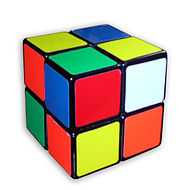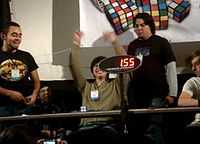Pocket Cube

The Pocket Cube (also known as the Mini Cube or the Ice Cube) is the 2×2×2 equivalent of a Rubik's Cube. The cube consists of 8 pieces, all corners.
Permutations



i. Solved pocket cube.
ii. Scrambled pocket cube.
iii.Pocket cube with one side tilted.
Any permutation of the eight corners is possible (8! positions), and seven of them can be independently rotated (37 positions). There is nothing identifying the orientation of the cube in space, reducing the positions by a factor of 24. This is because all 24 possible positions and orientations of the first corner are equivalent due to the lack of fixed centers. This factor does not appear when calculating the permutations of N×N×N cubes where N is odd, since those puzzles have fixed centers which identify the cube's spatial orientation. The number of possible positions of the cube is
The maximum number of turns required to solve the cube is up to 11 full turns, or up to 14 quarter turns.[1]
The number f of positions that require n full twists and number q of positions that require n quarter turn twists are:
| n | f | q |
|---|---|---|
| 0 | 1 | 1 |
| 1 | 9 | 6 |
| 2 | 54 | 27 |
| 3 | 321 | 120 |
| 4 | 1847 | 534 |
| 5 | 9992 | 2256 |
| 6 | 50136 | 8969 |
| 7 | 227536 | 33058 |
| 8 | 870072 | 114149 |
| 9 | 1887748 | 360508 |
| 10 | 623800 | 930588 |
| 11 | 2644 | 1350852 |
| 12 | 0 | 782536 |
| 13 | 0 | 90280 |
| 14 | 0 | 276 |
For the miniature (2 × 2 × 2) Rubik’s cube, the two-generator subgroup (the number of positions generated just by rotations of two adjacent faces) is of order 29,160. [2]
Records

Christian Kaserer holds the current world record of solving the Pocket Cube in competition, with a time of 0.69 seconds set at the Trentin Open 2011, using only four turns to solve the cube.[3][4] For the best average time of 5 solves, Lucas Etter holds the world record with a time of 1.60 seconds including the individual times of 1.59, 1.75, (1.96), (1.21) and 1.47. [4]
See also
.gif)
- Pyramorphix, a pyramidal puzzle that uses the same mechanism
- Rubik's Cube (3×3×3)
- Rubik's Revenge (4×4×4)
- Professor's Cube (5×5×5)
- V-Cube 6 (6×6×6)
- V-Cube 7 (7×7×7)
- Speedcubing
- Combination puzzles
References
External resources
Information about methods for speedsolving the 2x2x2
| ||||||||||||||||||||||||||||||||||||||||||||||||||||||||||||||||||||||||||||||||
